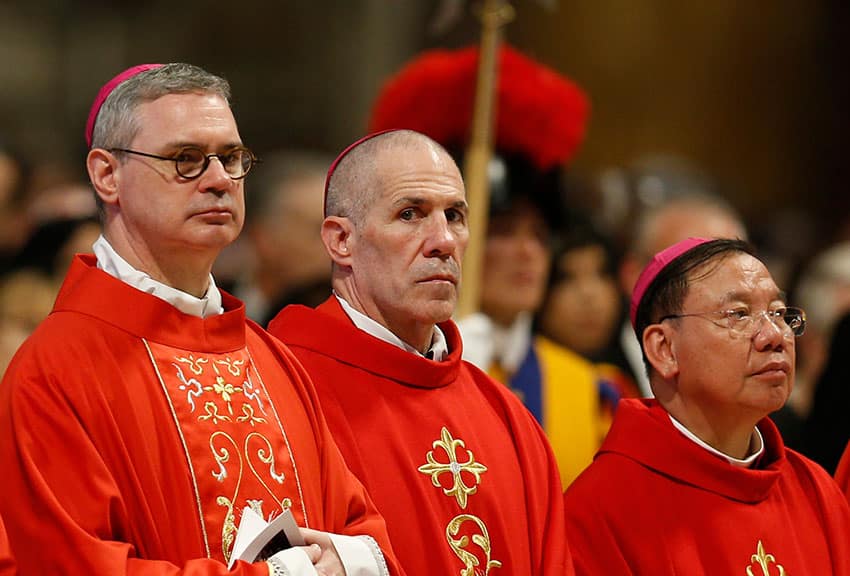
The Federal Government’s Religious Discrimination Bill would not introduce a “don’t ask, don’t tell” policy around divorce, sexual orientation or other attributes, representatives from the Australian Catholic Bishops Conference have told the first of two Parliamentary inquiries into the proposed laws.
Melbourne Archbishop Peter Comensoli told the Parliamentary Joint Committee on Human Rights that Catholic employment practices focus on “conduct more than attributes and character more than characteristics … which then define people into categories, which is not a good thing”.
Liberal MP Celia Hammond, a former Vice Chancellor of the University of Notre Dame Australia, said that such a view could lead to a “don’t ask, don’t tell mentality”, by which she meant that employees of Catholic agencies who did not live in keeping with Catholic belief would keep certain characteristics, like sexual orientation or marital status, secret with the tacit assent of their employer.
“Is that so, and is that actually healthy or good?” Hammond asked.
Questioning “problematic”
Archbishop Comensoli pushed back on the question as “problematic” and “somewhat of a generalisation”, and said employment was a matter for the situations of individual employees.
He was joined at the hearing by former ACU Dean of Law Professor Rocque Reynolds and Jeremy Stuparich, the ACBC Deputy General Secretary. Reynolds added that the bill, which would allow religious employers to prefer members of their own faith as long as a publicly-available policy was referred to, was “designed specifically to get away from [don’t ask, don’t tell]”.
“So, if we’re acting in accordance with a public and transparent policy, it does overcome this ‘don’t ask, don’t tell’ mentality,” she said.
“It probably is not healthy, and I think this bill addresses that in a really positive way.”
From the aggressive to the bizarre
The ACBC representatives replied to questions for almost an hour on 13 January, ranging from the straightforward, to the aggressive and bizarre.
Committee chair, Nationals MP Dr Anne Webster, asked the Archbishop for examples of discrimination against Catholic schools.
Archbishop Comensoli cited the 2021 amendments to the Victorian Equal Opportunity Act, which limited preferential hiring to roles in which “conformity with religious beliefs is an inherent requirement of the job”.
“We’ve always sought to employ those who will follow the mission, identity and values of our schools,” Archbishop Comensoli said.
“This comes down to a matter of a religion or an institution with religious values having a better sense of its own policies and understanding and values,” he added, before the deputy chair, Labor MP Graham Perrett, interjected.
“Are you putting the Pope before the minister of the Crown?” Perrett asked.
“I’m not Thomas More—or in that case St [John] Fisher,” Archbishop Comensoli replied.
Religious Discrimination Commissioner
The bill would also create the office of the Religious Discrimination Commissioner in the Australian Human Rights Commission, which Archbishop Comensoli addressed in his answers.
“I think there is a serious question when a [proposed religious] commissioner, who is likely to be a political appointment, is making judgements in areas that may not be their areas of expertise,” he said.
“We could have a broader discussion around whether there is a need for commissions and commissioners, but I think that’s not necessarily the point that you’re wanting to get at.”
“Just to be clear: you support a religious commissioner?” Perrett replied.
“We are open to having one,” Archbishop Comensoli said.
Waiting on the Law Reform Commission
Labor Senator Louise Pratt vigorously questioned the ACBC representatives on the effect of the new legislation on the existing patchwork of religious exemptions to anti-discrimination law, in response to Archbishop Comensoli’s position that the new legislation was an improvement on the status quo.
Stuparich noted that the role of avoiding unintended consequences ultimately falls to the future Australian Law Reform Commission inquiry, to take place a year after the legislation is passed.
“The frustration so far has been that the Law Reform Commission has had to be sitting on its hands for the past couple of years, waiting for this work to start,” he said.
Church of Ubuntu?
Momentary confusion ensued toward the end of the hearing when Greens Senator Janet Rice pressured the Archbishop to take a position on the vaccination policy of an organisation called the “Church of Ubuntu”.
The “Church of Ubuntu”, which describes itself as “a non-dualistic all embracing multi-faith philosophy and way of life” was recently mentioned in reports for allegedly sacking a Byron Bay woman who had received the COVID-19 vaccine.
“So you would support the position of the Church of Ubuntu to sack someone on the basis of being vaccinated if that’s their statement of belief?” Rice asked Archbishop Comensoli.
“I don’t know what it is. I am just seeing this now. It is the kind of thing we cannot comment on because we haven’t actually seen this,” the Archbishop replied.
“The High Court has been very careful about examining what is a tenet and belief, and it doesn’t go to just personal whims or any sorts of statements,” he added.
Seeking a bipartisan way forward
Archbishop Comensoli said the Catholic Church has been “working very hard to try and find a bipartisan way through all of this, and the leaders of both the major parties are aware of the conversations that we’ve had to try and bring something around that”.
The ACBC submission and statements to the public hearing have emphasised the reasonableness of the bill, with Professor Reynolds saying that it has “found a good balance” in protecting the rights of religious believers to express “hard truths” that may be perceived as offensive, but aren’t intimidatory or threatening, while also disallowing harassment and vilification.
The committee also heard evidence from Jacinta Collins on behalf of the National Catholic Education Commission, from other faith organisations, as well as a range of legal experts, think tanks and lobby groups.
A second inquiry into the bill, at the Senate Standing Committee for Legal and Constitutional Affairs, will hold hearings on 20 and 21 January.
Related
